To be successful in a highly competitive real estate marketplace, agents must know the latest marketing trends and statistics to continuously increase their brand awareness, generate leads, and drive traffic to their websites. Understanding the latest real estate marketing statistics allows real estate agents to make informed decisions about allocating their marketing budget to receive optimal marketing results and stay ahead of their competition.
We’ve researched the top real estate agent marketing statistics agents should know for optimal business growth.
General Real Estate Marketing Statistics
Real estate agents who want to grow their business and generate more leads need to start with a solid understanding of their clients and the marketing channels that might be best for their needs. The following real estate marketing statistics reveal important data about homebuyers and sellers and the marketing strategies that are used most successfully.
1. Pricing a home competitively is the most important service for 23% of homesellers
The 2023 Home Buyers and Sellers Generational Trends Report by the National Association of Realtors (NAR) found that the top reason homesellers hire an agent is to help them competitively price their homes. Twenty-three percent, the largest percentage of homesellers, stated that this was the service they wanted most from their real estate agent.
However, coming in at 10% under that was hiring an agent to help sell the property within a specific time frame. This includes important tasks like creating online listings, taking professional photographs, and developing a marketing strategy to attract potential buyers, as well as past experience selling homes effectively.
Key takeaways:
- In addition to having access to available listings or showing properties, sellers are more interested in having an agent assist with selling a property because of their marketing skills and market knowledge.
- Specifically showing your expertise in the local real estate market, your pricing strategy, and the time your listings spend on the market will help you generate seller leads.
- Agents who have strong listing marketing plans and can effectively promote their clients’ properties are likely to be more successful in attracting and retaining listing clients in the future.
2. 47% of homebuyers’ first step during the buying process was to look at properties online
It’s crucial for new and experienced agents alike to understand that before a client contacts them, they have likely already done some research on their own. Realtor sales statistics show that the first step that 47% of homebuyers take is to look at properties for sale online. Only 18% of surveyed homebuyers reported that they contacted an agent first, and even fewer homebuyers read information online about the homebuying process (8%).
These numbers emphasize the role that the internet and digital marketing play in the homebuying process and how it’s essential for real estate agents to have a solid online presence and effective digital marketing strategies to attract potential buyers.
Key takeaways:
- The most optimal place to target real estate buyer leads is where they start looking, which is online listings and educational content.
- A comprehensive online marketing strategy is required of real estate agents to promote their sales listings. Listings now must include detailed property information, professional photographs, and virtual tours to provide a clear and engaging view of the property.
- Real estate agents must be up to date with the latest technology. This includes using digital signatures, client relationship management (CRM) systems, and other tools to make the buying process as efficient and stress-free as possible.
3. 39% of sellers used the same agent to buy & sell their homes
The NAR report found that 39% of sellers use the same agent to buy and sell their homes. However, as the seller’s age increased, using the same real estate agent declined as the distance an individual moved increased. These real estate agent statistics show that younger homeowners and sellers may be more loyal to their agents, while older clients need more consistent nurturing and communication.
Key takeaways:
- Even though real estate marketing trends are typically focused on generating new leads, the research proves that your previous clients are the most likely source of seller leads.
- In order to get repeat business from your previous clients and generate real estate referrals, make sure to provide exceptional service and maintain regular communication with clients.
- Add previous clients to an email marketing campaign or monthly newsletter. This will foster deeper connections and encourage future business.
- Implement a client relationship manager (CRM) to facilitate consistent communication between you and your previous clients.
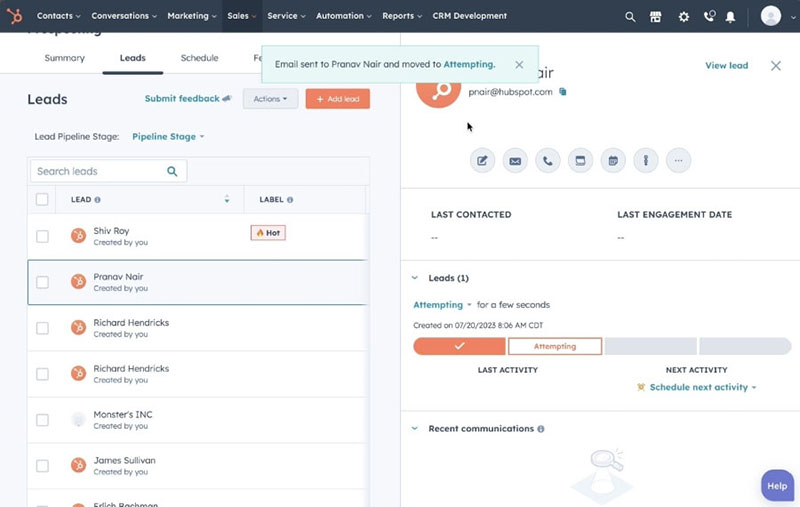
HubSpot CRM lead pipeline management (Source: HubSpot)
Agents don’t need to invest in the most expensive CRM for it to be effective. For example, HubSpot is a CRM platform that offers free tools for agents to test out some of their foundational marketing, sales, and operation tools before committing to an annual plan. The free plan even allows agents to build a website with a custom domain. The platform provides agents with a visual dashboard to track and analyze sales activity, and it offers 24/7 support.
4. 451% increase in qualified leads through marketing automation software
Marketing automation software helps real estate agents increase efficiency by automating time-consuming but necessary tasks, such as lead nurturing and follow-up. According to a study by the Annuitas Group, companies that used marketing automation tools increased lead engagement and improved sales by 451%. At the same time, lead quantity increased by 80%.
Key takeaways:
- By automating daily repetitive tasks like lead nurturing with marketing automation software, real estate agents can save time and increase productivity to focus on other important tasks that require their physical presence.
- Investing in the right marketing automation tools can streamline your business and increase revenue.
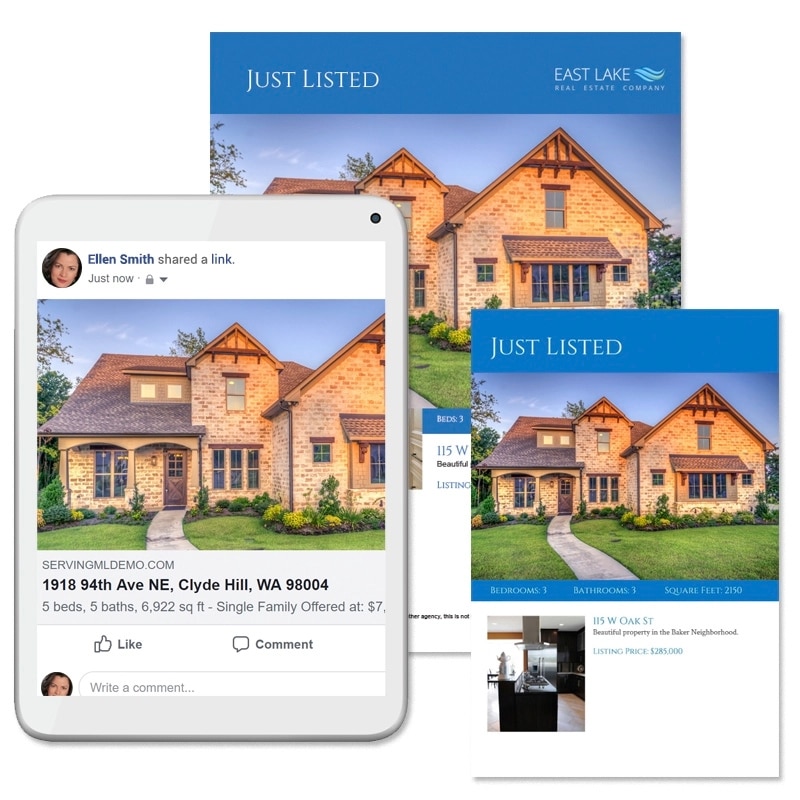
Sharing your listings on your real estate website (Source: Market Leader)
Marketing automation software has significantly changed how real estate agents approach their marketing efforts. By using a versatile real estate marketing company like Market Leader, you’ll have the right tools for multiple important marketing tasks. For instance, Market Leader provides automated email marketing and scripts, print marketing for listings, single property landing pages, and customizable websites.
Real Estate Social Media Statistics
Social media is an incredibly powerful and effective marketing tool for real estate agents. It can help you build a following, engage with buyers and sellers digitally, and generate high-quality leads who already trust your services and skills. By being familiar with the real estate facts for social media marketing, you’ll be able to focus on the social platforms and strategies that will most efficiently increase your reach and grow your business.
5. In 2023, there are 4.9 billion social media users in the world
It is undeniable that social media is a powerful platform, with over 4.9 billion current users. Even more interesting is the fact that the number of social media users is expected to increase to 5.85 billion by 2027.
The growing number of social media users shows that there is still a huge opportunity for real estate agents to expand their reach to generate new business. Not only should agents advertise on social platforms, but it’s an opportunity for real estate agents to showcase their expertise by providing valuable content and insights on the real estate market.
Key takeaways:
- Social media platforms, such as Facebook, Instagram, and Twitter, offer powerful marketing and advertising tools that let agents target specific demographics and increase the visibility of their listings.
- Check out the 9 Best Real Estate Social Media Marketing Companies that help with content creation, advertising, and automation expertise to ensure your marketing produces quality leads and engagement.
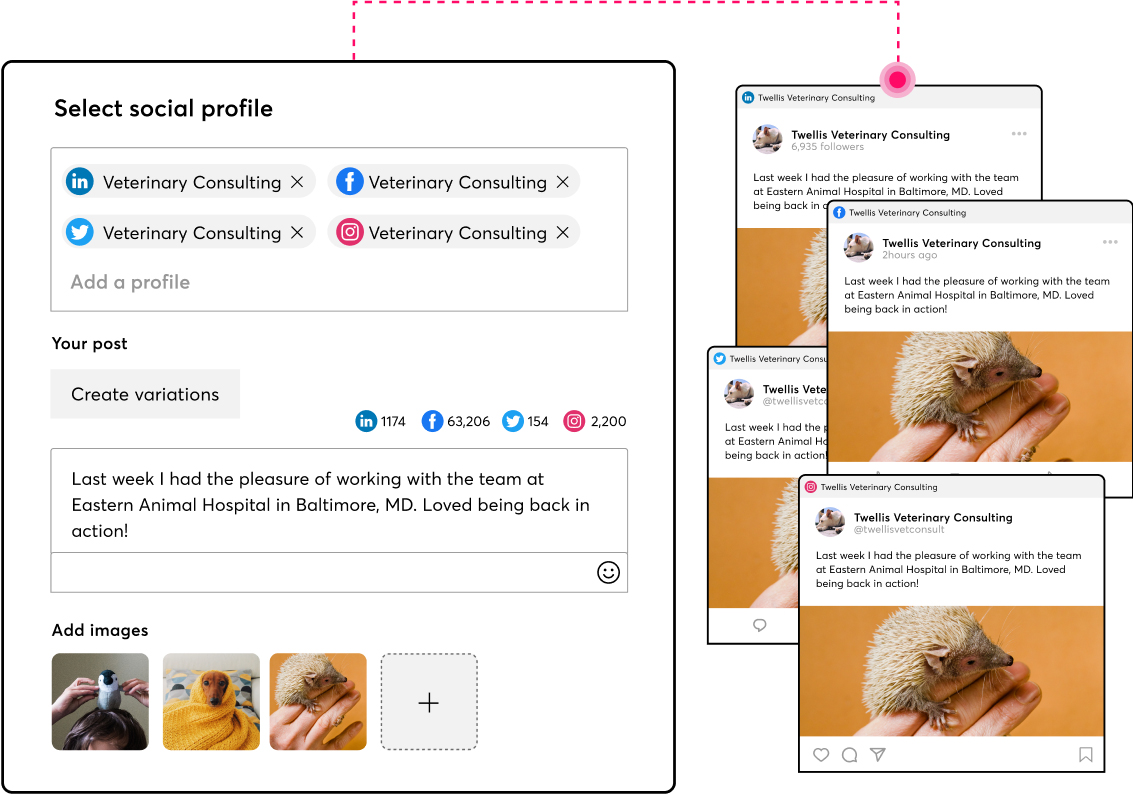
Social media post scheduler (Source: Constant Contact)
Constant Contact is a robust digital marketing platform that offers a plethora of tools and services to help real estate professionals expand their businesses and establish strong relationships with their clients. With Constant Contact, agents can execute effective marketing campaigns on email and social media. The platform’s intuitive interface and customizable features make it an ideal solution for real estate agents of all experience levels, allowing them to focus on growing their businesses and connecting with prospective clients.
6. 89% of agents use Facebook for their real estate business
Facebook is the most popular social media platform for real estate marketing, with 89% of real estate agents using it for their business. Instagram comes in second, with 59% of agents using it and 53% of agents using LinkedIn.
Agents who are not leveraging the top three social platforms popular with real estate agents are missing out on a market share of prospective clients. In addition, more interesting facts about real estate agents showed that only 26% use YouTube and 12% use TikTok. This provides an opportunity for agents to target potential clients on platforms with significantly less competition.
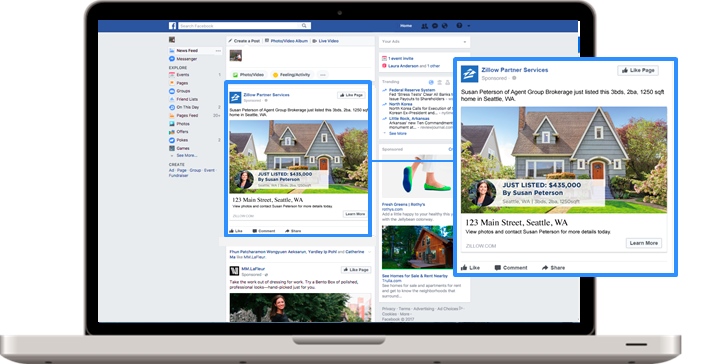
Facebook listing advertisement example (Source: Zillow Premier Agent)
Key takeaways:
- Facebook is the most popular real estate social networking site for agents.
- The visual platform and social nature of Facebook make it ideal for sharing and promoting real estate listings. Listings with video content, professional photos, and detailed property information can generate strong engagement and sharing, leading to more visibility and potential leads.
- Real estate Facebook ads provide tools to target specific demographics and interests, increasing the likelihood of reaching potential buyers who are most likely to be interested in the listing.
- Social media platforms like Instagram, TikTok, and YouTube are less commonly used by real estate agents. Although they may be challenging to learn, they provide an opportunity to market a real estate business with less competition.
Visit our article 6 Most Effective Ways to Generate Facebook Real Estate Leads to gain a further understanding of how you can leverage Facebook for your real estate business.
7. 51% of social media users share videos more than any other type of content
One 2023 study found that 51% of social media users are more likely to share videos with their friends than any other type of content, including text or images. By incorporating video content into your real estate social media strategy, agents can massively increase engagement and shareability, ultimately leading to more visibility and leads. Video content can also build trust and credibility with potential clients, as it provides a more authentic and personal way to connect with them.

Real estate agent Instagram page with video content (Source: Instagram)
Key takeaways:
- Video content is the most powerful type of content to increase your reach online, so learning how to talk in video or use trending topics and filters will enable you to successfully market your business.
- Using video for listings can provide a more comprehensive view of the property, allowing potential buyers to get a better sense of the layout and features of the home.
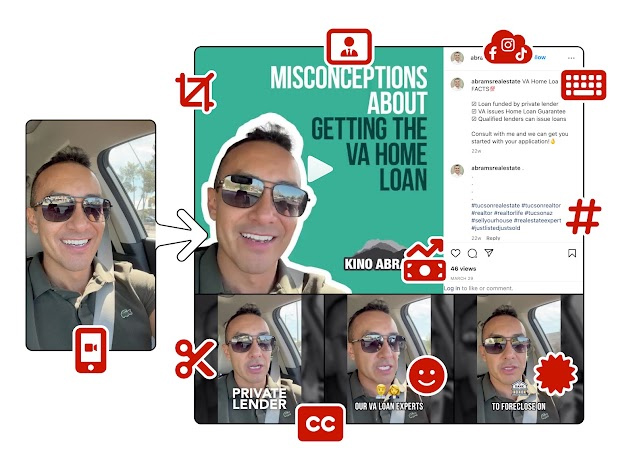
BrandBuilder capabilities for social media (Source: REDX)
REDX’s BrandBuilder tool allows real estate agents to build and manage their brands across different social media channels. The BrandBuilder tools enable agents to create and customize their social media videos, ads, and posts, and edit their profiles. Agents looking to establish a strong and effective brand presence online can leverage REDX’s BrandBuilder to convert social leads into new business opportunities.
Email Marketing Statistics
Real estate email marketing allows agents to reach a large audience with targeted and personalized messages at a relatively low cost. With a well-crafted email campaign, agents can engage with their audience, promote listings, and build long-term client relationships. Understanding the latest email marketing trends enables agents to maximize the impact of their campaigns and generate more leads and sales.
8. The average expected ROI for email marketing is $36 for every $1 you spend
Email marketing generates an average return on investment (ROI) that is significantly higher than most other marketing channels. For example, while Constant Contact found the average ROI of email marketing to be $36 for every $1 spent, a different study found the average ROI of social media marketing is about $2.80 for every $1 spent.
Although calculating return on investment can vary based on a wide number of factors, there are multiple reasons why the email ROI is so high. These include the ability to send campaigns to a targeted list of clients, track and analyze email campaign performance, and have a high engagement and conversion rate. Agents can take advantage of the high ROI and get more leads on email campaigns by ensuring their email messaging matches their curated audience list.
Key takeaways:
- Sending emails is one of the most likely marketing strategies to generate clients and increase your income.
- Email campaigns are highly trackable and measurable, allowing real estate agents to analyze the performance of their campaigns and make adjustments as needed.
- Purchasing targeted email marketing lists can be a useful strategy for real estate agents looking to expand their reach and connect with potential clients.
9. In 2022, the average open rate for real estate emails was 21.7% & the average click-through rate was 3.6%
The open rate of an email refers to the percentage of recipients who click and open an email, while the click-through rate refers to the percentage of recipients who take the next step and click on a link within the email. The overall average open rate for marketing emails is 21.5%, but the average rate for real estate marketing emails is a bit higher at 21.7%.
Knowing important realtor facts like the industry average open and click-through rates for emails can help agents understand how well their email campaigns are performing and make data-driven decisions to improve their results. Attempting to compare your campaign performance to other industries is like comparing apples to oranges, but knowing relevant real estate statistics will make more strategic improvements.
Industry | Open Rate | Click-through Rate | Click-to-Open Rate | Unsubscribe Rate |
|---|---|---|---|---|
Advertising & Marketing | 20.5% | 1.8% | 9.0% | 0.2% |
Agriculture, Forestry, Fishing & Hunting | 27.3% | 3.4% | 12.5% | 0.3% |
Consumer Packaged Goods | 20% | 1.9% | 11.1% | 0.1% |
Education | 28.5% | 4.4% | 15.7% | 0.2% |
Financial Services | 27.1% | 2.4% | 10.1% | 0.2% |
Restaurant, Food & Beverage | 18.5% | 2.0% | 10.5% | 0.1% |
Government & Politics | 19.4% | 2.8% | 14.3% | 0.1% |
Healthcare Services | 23.7% | 3.0% | 13.4% | 0.3% |
IT/Tech/Software | 22.7% | 2.0% | 9.8% | 0.2% |
Logistics & Wholesales | 23.4% | 2.0% | 11.7% | 0.3% |
Media, Entertainment & Publishing | 23.9% | 2.9% | 12.4% | 0.1% |
Nonprofit | 26.6% | 2.7% | 10.2% | 0.2% |
Other | 19.9% | 2.6% | 13.2% | 0.3% |
Professional Services | 19.3% | 2.1% | 11.1% | 0.2% |
Real Estate, Design & Construction | 21.7% | 3.6% | 17.2% | 0.2% |
Retail | 17.1% | 0.7% | 5.8% | 0.1% |
Travel, Hospitality & Leisure | 20.2% | 1.4% | 8.7% | 0.2% |
Wellness & Fitness | 19.2% | 1.2% | 6.0% | 0.4% |
Average Totals | 21.5% | 2.3% | 10.5% | 0.1% |
Email Marketing Benchmarks and Statistics for 2022 (Source: Campaign Monitor) | ||||
Key takeaways:
- Compared to other industries, consumers are slightly more likely to open and engage with real estate emails—making email marketing a high priority for real estate agents.
- By creating compelling subject lines and content that resonate with their audience, agents can increase the likelihood of recipients opening their emails and engaging with their message.
- One way to improve email open and click-through rates is to focus on personalization. By addressing recipients by name, segmenting email lists by interests and behaviors, and tailoring content to the needs and preferences of the audience, real estate agents can increase the relevance and engagement of their email campaigns.
Real Estate Video Statistics
Video marketing has become an essential tool for real estate agents, increasing engagement and generating more leads. This is because video content is more likely to be shared and viewed than text-based content. Plus, the rise of social media platforms with audiences that desire short-form and long-form videos like those on YouTube, Instagram, and TikTok makes using video in your marketing a powerful tool.
10. In 2023, video content reaches 92% of all internet users
According to Statista, online videos reach 92% of global internet users, making it the most popular online format for different types of content. A few of the most popular types of video content range from music videos, comedy or meme videos, how-tos, educational videos, and vlogs. This is ideal for real estate professionals because there are endless ways to share real estate-related video content in almost every category.
Key takeaways:
- Video reaches an incredibly large portion of the public, so finding a way to create video content is crucial for successful real estate marketing.
- Real estate professionals should be using video for more than just listings. Getting creative with video will help reach the maximum number of people.
11. 90% of marketers say video has helped them generate leads
For all real estate professionals, the success of their business is fully dependent on their ability to generate leads and make sales. A detailed study by Wyzowl revealed that 90% of marketers in 2023 claimed that video directly impacted lead generation. The same study also revealed that 87% of all marketers believed video helped them increase sales.
Notably, when evaluating both of these real estate marketing statistics by year, they are at an all-time high. It’s clear that using video is an increasingly powerful tool to grow an agent’s business.
Key takeaways:
- Video allows real estate agents to generate leads and increase brand awareness because of their personal nature and high level of engagement.
- The effectiveness of marketing videos continues to increase, so it’s an important strategy for new agents or experienced agents who haven’t done it yet.
12. Real estate listings with video receive 403% more inquiries than those without
Real estate-specific websites benefit from having videos because they generate 403% more inquiries than similar websites without listings. Agents can provide a more immersive and interactive experience for potential buyers by using video content to showcase properties, which will ultimately lead to more inquiries and sales.

Listing video marketing (Source: ProspectsPLUS!)
Key takeaway:
- Video allows clients to visualize themselves in the property and get a better sense of the property’s features and layout. This increased engagement can lead to higher conversion rates and, ultimately, more sales.
Print & Direct Mail Marketing Statistics
With so much focus on digital marketing, print and direct mail marketing may seem like outdated strategies. However, these traditional marketing channels continue to play a vital role in the industry, offering unique benefits that cannot be matched by digital channels alone. From postcards to brochures, print and direct mail effectively reach potential clients and promote real estate listings.
Continue reading these real estate agent marketing statistics and learn how to leverage more traditional strategies to reach and convert leads.
13. Direct mail has the highest ROI of all advertising campaigns
One of the fun facts about real estate agents is that direct mail is one of the most time-tested marketing strategies in the industry. Real estate professionals have used mailers to market their services for decades, and this strategy continues to be effective. Throughout 2022, direct mail had an average ROI of 43%, which is higher than email, social media, paid search, and SMS marketing.
There are many factors to consider when evaluating the investment and potential return of any marketing strategy. Direct mail is an affordable and versatile tool to build brand awareness and successfully target your ideal audience and farm area.
Key takeaways:
- Sending mailers is affordable, and there are many ways to customize your campaigns and mailing list to effectively target your ideal audience.
- Direct mail still consistently generates high-quality leads for real estate professionals, so it’s one of the most important real estate marketing materials you have.
- To get started with direct mail, read our collection of the Top 18 Real Estate Farming Postcards, Ideas & Templates.
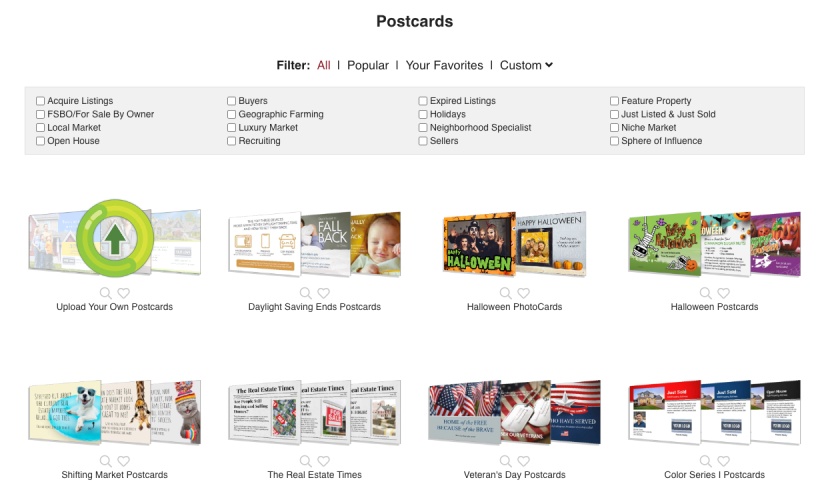
Postcard templates and campaigns (Source: ProspectsPLUS!)
One of the best ways to maximize your ROI is by using a real estate direct mail service like ProspectsPLUS! Agents can select from a variety of mailer formats like flyers, postcards, door hangers, etc. For agents who don’t have already established contact lists, they can purchase various contact lists through ProspectsPLUS! based on interests, demographics, or through Every Day Door Mailers service. The high-quality printing and mail services offered ensure agents’ direct mailers stand out for better lead generation.
14. 63% of Gen Z consumers were more excited about direct mail in 2022 than they were in 2021
A 2022 report by RRD Marketing Solutions states that 63% of Gen Z consumers born between 1997 and 2012 (ages of 11 to 26) are more excited about direct mail now than in previous years. Although this younger demographic is often thought of as being more digitally focused, this real estate marketing trend shows a shift in their preferences. Gen Z consumers are drawn to the tactile and personalized nature of direct mail, which can offer a unique and engaging experience compared to other marketing channels.
Key takeaways:
- Real estate agents should not overlook the Gen Z demographic when considering their target audience for direct mail strategies.
- Creating personalized and engaging direct mail campaigns allows agents to connect with potential clients in a meaningful way.
15. 70% of real estate agents mail postcards in quantities of 750 cards or less
Based on a large study from PostcardMania, it was discovered that three out of every four direct mailer batches for real estate agents was 500 pieces or less. Sending a large number of mailers or having a large contact list doesn’t necessarily mean you’ll get more leads. In fact, sending a smaller batch of mailers can help you hyper-target specific areas or niche clientele.
Key takeaways:
- Rather than sending mass mailings to a broad audience, agents use postcards as a targeted tool to reach specific demographics and neighborhoods. This approach can result in a more engaged and receptive audience.
- Agents who are just starting out or don’t have a large contacts list developed should not be discouraged from executing direct mail marketing strategies. As your business grows and you collect more contact information, agents can gradually increase their direct mail efforts.
Mobile Real Estate Marketing Statistics
Mobile devices have become an essential part of modern life, and this trend is particularly evident in the real estate industry. Today’s consumers use their smartphones and tablets to search for properties, connect with agents, and browse real estate listings. As a result, real estate agents must adopt mobile-friendly marketing strategies to meet the needs of this increasingly mobile audience.
16. 73% of homebuyers used mobile or tablet devices to search for properties in 2022
Real estate agents must ensure that their website and marketing content are mobile-friendly and easily accessible to potential clients on the go. Even though real estate agents were the number one source of information for homebuyers, 73% of homebuyers used their mobile or tablet for information searches.
Key takeaways:
- Even though you may work on your digital marketing strategies on a computer, remember that potential clients are likely to view it on a mobile device. Ensure that all website content and marketing materials are optimized for mobile devices.
- Leverage mobile-friendly marketing strategies like QR codes to get your consumers from print marketing to mobile or desktop to mobile
17. 54% of consumers will pay attention to your mobile ad because of brand familiarity
Many professionals use real estate ads to promote their services and generate new leads. However, it’s important for agents to understand that paying for advertising doesn’t guarantee anything if you don’t have a strong marketing and brand-building strategy.
In fact, one study reported that brand familiarity is the most attention-grabbing factor of online ads. Having interesting and creative content is a close second, but this marketing statistic shows that developing a strong real estate brand will positively impact all your marketing efforts.
Key takeaways:
- Regardless of what advertising strategy you use, it’s important to start with a strong foundation. Make sure you develop a real estate marketing plan to maximize the impact of all your marketing efforts.
- Create matching brand material on all platforms, both online and offline, to bring awareness through recognition of your brand.
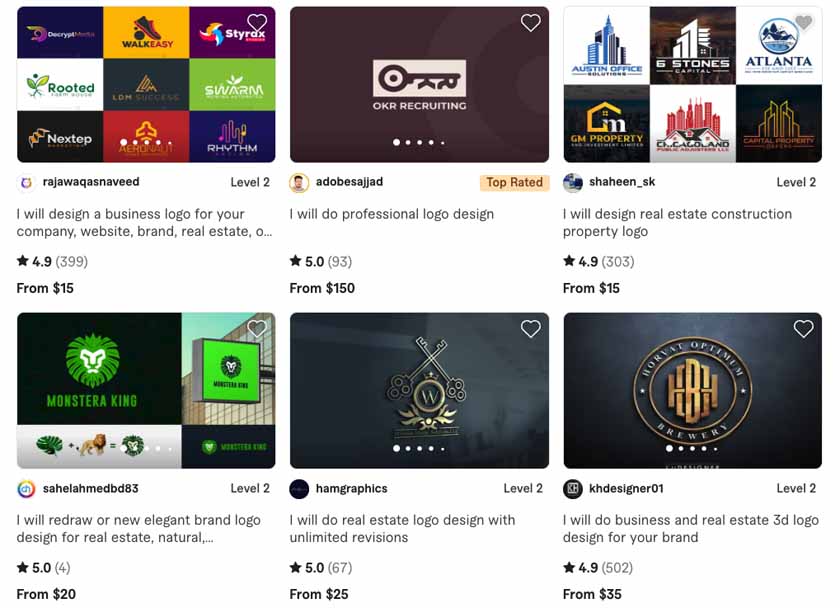
Real estate branding freelance services (Source: Fiverr)
To create and develop brand familiarity, real estate agents can hire independent freelance marketers on Fiverr to assist with creating their brand identity. Items like a designated color palette, logo, and branded marketing materials can contribute to your overall brand identity. The freelancers at Fiverr can also work on a project-to-project basis, depending on your marketing budget, without needing to hire full-time team members.
Learn all about developing a brand that will elevate your business in our detailed guide Real Estate Branding: 11 Steps to Build a Strong Realtor Brand.
Leveraging Artificial Intelligence for Marketing
Artificial intelligence (AI) is rapidly transforming the marketing industry, and real estate agents can benefit from utilizing this cutting-edge technology to improve their marketing efforts. Using AI-powered tools, agents can analyze data, personalize marketing messages, and automate tasks, ultimately resulting in more effective and efficient marketing campaigns.
18. 44% of marketers are consistently using AI in content production
According to the Artificial Intelligence (AI) Marketing Benchmark Report, 44.4% of marketers say they are consistently using AI to produce content. In addition, 12.3% say they use it for conversion optimization, and 11.7% use AI for customer service. The increase in leveraging AI in marketing frees up agents’ manual tasks while assisting new agents in communicating and understanding their clients better.
Key takeaways:
- Statistics reflect a growing recognition of the value of AI in improving the efficiency and effectiveness of marketing efforts and overall business management.
- Agents who incorporate AI into their business can help them stay ahead of the competition with enhanced marketing strategies.
19. More than half of marketers (54.5%) believe AI will enhance their marketing efforts
The use of AI in marketing has had a mixed reception, but 54.5% of marketers say that they believe AI will enhance their marketing efforts. AI powers a real estate agent’s lead generation, personalized marketing, and customer engagement.
Tasks that normally would require a larger team or substantial time to complete are now being completed by AI tools. Agents who learn to embrace AI and machine learning as tools to help their productivity will see a significant increase in their ability to utilize their time better and deliver more value to their clients.
Key takeaways:
- Agents can use AI to analyze their real estate agent sales data to determine where they should focus their efforts.
- In addition to AI, other significant automation trends involve using machine learning and data analytics to improve marketing campaign performance, complete internal workflows, and increase customer engagement.
Bottom Line
The real estate marketing landscape is continuously evolving with the increase of social media, video marketing, and the need for more personalized content. In order to get the best results from your efforts, it’s important to stay informed about real estate agent marketing statistics. Understanding current marketing trends and data will help you generate more leads, increase brand visibility, and ultimately grow your business.